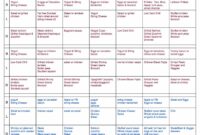Fast Beach Diet: Achieving a beach-ready physique often involves a quest for rapid weight loss. This pursuit, however, requires careful consideration of nutritional balance, sustainable exercise, and potential health risks. Understanding the various approaches to a “fast beach diet,” including their benefits and drawbacks, is crucial for making informed decisions about your health and well-being. This guide will explore the nuances of rapid weight loss strategies, providing insights into creating a safe and effective plan.
We will delve into the specifics of meal planning, focusing on healthy choices that support quick weight loss without compromising nutritional needs. The importance of exercise, particularly high-intensity interval training (HIIT), will be highlighted as a crucial component for achieving optimal results. Crucially, we’ll address the potential risks associated with rapid weight loss and emphasize the importance of consulting a healthcare professional before embarking on any drastic dietary changes.
Defining “Fast Beach Diet”
The term “fast beach diet” lacks a formal, universally accepted definition. It’s a colloquialism referring to any rapid weight-loss plan adopted in anticipation of beach season, typically characterized by its restrictive nature and short duration. Essentially, it encompasses a variety of approaches aimed at achieving quick, visible results before a specific event, like a vacation.
The common interpretations center around the urgency to lose weight quickly, often driven by social pressures associated with summer body ideals. This urgency frequently leads to unsustainable and potentially harmful dietary practices. These diets often prioritize rapid weight loss over long-term health and sustainable lifestyle changes.
Examples of Fast Beach Diet Plans
Many diet plans are associated with the “fast beach diet” concept, though none are officially designated as such. These typically involve severe calorie restriction, often combined with specific food exclusions. For instance, some popular examples include very low-calorie diets (VLCDs), ketogenic diets implemented aggressively, or juice cleanses. These methods promise rapid results but often lack essential nutrients and can lead to various health complications. Another common approach involves eliminating entire food groups, like carbohydrates or fats, which can lead to nutritional deficiencies. Finally, some individuals employ extreme measures like fasting for extended periods, a practice which should only be undertaken under strict medical supervision.
Potential Health Risks of Rapid Weight Loss Diets
Rapid weight loss, regardless of the method, carries significant health risks. These risks stem from the body’s inability to adapt to such drastic changes in energy intake. Common issues include nutrient deficiencies, muscle loss, metabolic slowdown, and electrolyte imbalances. The rapid loss of fluids and electrolytes can lead to dizziness, fatigue, and even heart problems. Furthermore, such diets often lead to yo-yo dieting, where weight is lost quickly, only to be regained, sometimes with additional weight added, due to the unsustainable nature of the approach. The cyclical nature of yo-yo dieting can negatively impact metabolic health and increase the risk of chronic diseases.
Potential Benefits of Rapid Weight Loss Diets (with caveats)
While the risks significantly outweigh the benefits, there can be a short-term psychological boost associated with seeing rapid weight loss. This improved self-esteem and confidence can be motivating, but it’s crucial to understand that this is not a sustainable approach to weight management. Any perceived benefit is temporary and quickly overshadowed by the potential long-term health consequences. The only true benefit of rapid weight loss is if done under strict medical supervision, for example, in cases of severe obesity where a medically managed rapid weight loss program is considered necessary. Even in these circumstances, careful monitoring is essential to minimize risks.
Nutritional Aspects
Achieving rapid weight loss, as often touted by “fast beach diet” plans, requires a careful consideration of nutritional balance and sustainability. While quick results are tempting, it’s crucial to understand the potential drawbacks of various approaches and prioritize a healthy, balanced plan for long-term success. This section will delve into the nutritional components of rapid weight loss diets, comparing different approaches and providing a sample meal plan emphasizing wholesome ingredients.
Comparison of Rapid Weight Loss Diet Approaches
Several diet strategies promise quick weight loss, each with its own set of nutritional implications. Ketogenic diets, for example, drastically reduce carbohydrate intake, forcing the body to burn fat for energy. This can lead to initial rapid weight loss, but may also result in nutrient deficiencies if not carefully planned. Very low-calorie diets (VLCDs) severely restrict caloric intake, resulting in significant weight loss, but they often necessitate medical supervision due to the risk of nutrient deficiencies and muscle loss. Intermittent fasting, another popular method, involves cycling between periods of eating and voluntary fasting. While it can be effective for weight loss, its long-term effects and suitability for everyone are still being researched. Finally, balanced calorie-controlled diets, while slower in producing results, generally offer a more sustainable and nutritionally sound approach to weight loss.
Sample “Fast Beach Diet” Meal Plan
The following meal plan focuses on nutrient-rich foods, emphasizing lean protein, healthy fats, and plenty of fruits and vegetables. It’s designed to provide a moderate calorie deficit, supporting weight loss while maintaining essential nutrients. Remember that individual caloric needs vary significantly based on factors such as age, activity level, and metabolism. Consult a healthcare professional or registered dietitian to personalize this plan to your specific requirements.
| Breakfast | Lunch | Dinner | Snacks |
|---|---|---|---|
| Greek yogurt (1 cup) with berries (½ cup) and a sprinkle of almonds (¼ cup) | Grilled chicken salad (4 oz chicken, 2 cups mixed greens, ½ avocado) with a light vinaigrette dressing | Baked salmon (4 oz) with roasted vegetables (1 cup broccoli, carrots, peppers) | Apple slices with 2 tablespoons of peanut butter |
| Oatmeal (½ cup) with fruit (½ cup) and a small handful of walnuts | Lentil soup (1.5 cups) with a whole-wheat roll | Lean ground turkey stir-fry (4 oz turkey) with brown rice (½ cup) and plenty of vegetables | A small handful of trail mix (nuts, seeds, dried fruit) |
| Scrambled eggs (2) with spinach and whole-wheat toast (1 slice) | Tuna salad sandwich on whole-wheat bread (4 oz tuna, lettuce, tomato) | Chicken breast (4 oz) with quinoa (½ cup) and steamed green beans (1 cup) | Hard-boiled egg |
Sustainable Lifestyle Changes
The “Fast Beach Diet,” while effective for short-term weight loss, shouldn’t be viewed as a standalone solution. True, lasting weight management hinges on integrating sustainable lifestyle changes that extend far beyond the pursuit of a summer physique. This section will explore the differences between short-term and long-term approaches, provide actionable strategies for maintaining a healthy lifestyle year-round, and offer practical tips for incorporating healthy habits into your daily routine.
Short-term weight management strategies, like crash diets or intense workout regimens, often prioritize rapid weight loss. These methods, while potentially resulting in quick visible changes, frequently lack sustainability. Long-term strategies, conversely, focus on gradual, consistent changes in diet and exercise, leading to healthier habits and sustained weight management. The key difference lies in the approach: short-term focuses on immediate results, while long-term prioritizes lasting lifestyle modifications.
Comparing Short-Term and Long-Term Weight Management Strategies
Short-term strategies often involve restrictive diets, potentially leading to nutrient deficiencies and metabolic slowdown. They may also involve intense, unsustainable exercise regimes that can lead to injury or burnout. In contrast, long-term strategies emphasize balanced nutrition, moderate exercise, and behavioral changes that promote lasting healthy habits. For example, a short-term approach might involve drastically cutting calories, while a long-term approach might involve gradually reducing portion sizes and making healthier food choices. Similarly, a short-term approach might involve daily high-intensity interval training (HIIT), while a long-term approach might incorporate a mix of cardio and strength training spread across the week.
Maintaining a Healthy Lifestyle Beyond the “Beach Season”
Sustaining weight loss and healthy habits requires a shift in mindset. It’s not about a temporary fix but a long-term commitment to well-being. One effective strategy is to set realistic, achievable goals. Instead of aiming for drastic changes overnight, focus on incremental improvements. For instance, instead of eliminating all sweets, try reducing your intake gradually. Another crucial aspect is building a support system. Surrounding yourself with like-minded individuals who share your health goals can provide encouragement and accountability. This could involve joining a fitness group, working with a nutritionist, or simply sharing your progress with supportive friends or family. Finally, remember to celebrate your successes, no matter how small. Acknowledging your achievements reinforces positive behavior and keeps you motivated.
Incorporating Regular Exercise and Healthy Eating Habits into Daily Routines
Integrating healthy habits into your daily life requires planning and consistency. Start by scheduling regular exercise, just like any other important appointment. Even short bursts of activity throughout the day, like taking the stairs or walking during your lunch break, can make a difference. Consider incorporating activities you genuinely enjoy, whether it’s dancing, swimming, or hiking, to enhance adherence. Regarding diet, prioritize whole, unprocessed foods such as fruits, vegetables, lean proteins, and whole grains. Meal prepping can significantly simplify healthy eating, reducing the temptation to opt for less healthy choices when time is short. Furthermore, mindful eating—paying attention to your hunger and fullness cues—can help prevent overeating. By consciously choosing nutrient-rich foods and engaging in regular physical activity, you can establish a sustainable and enjoyable path towards long-term health and well-being.
Final Wrap-Up
Ultimately, a successful “fast beach diet” hinges on a holistic approach that integrates healthy eating, regular exercise, and a mindful understanding of one’s body. While rapid weight loss can be tempting, prioritizing long-term health and well-being should always take precedence. This guide aims to equip you with the knowledge to make informed choices, empowering you to pursue your fitness goals safely and effectively, while establishing sustainable habits for lasting results beyond the beach season.




